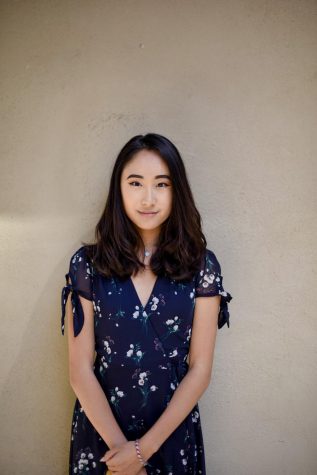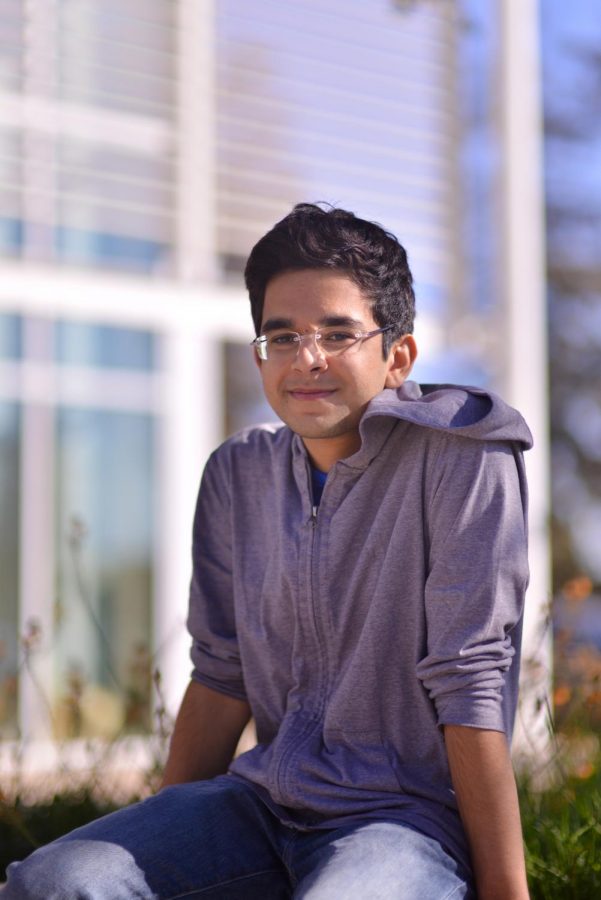Humans of Harker: Work and play
Ayush Alag finds time for balance
“I always tell myself to remember to balance everything. I feel like since I’m not specifically doing just CS or just research, I have to tell myself to make time for everything that’s important. I have that tendency to go really deep into it, which is great, but I also need to tell myself to take breaks and go outside and play with my brother or something,” Ayush Alag (12) said.
His eyes land on a point in the space before him, one that vaguely correlates to the right-most door along the lobby of the RPAC, but he does not seem to see either the glass or the white columns before him. A flickering light behind the clear, boxy frames of his glasses betrays a glimmer of his thought as he mulls over the question, running through the list of pieces playing in his mind. A vague smile fumbles to put melodies to words.
“I guess it just varies a lot,” Ayush Alag (12) said at last, with a slight chuckle. “Sometimes it’s Bach. Bach is pretty nice.”
Though he speaks of composers like Bach and Mozart as if they were his long-lost colleagues, Ayush has only welcomed them into the circle of his acquaintances over the past four years. To be fair, he has been playing their pieces on the violin for years, he did not become as devoted to the craft until his freshman year, when he came to befriend music and embrace its growing importance to his work as a musician.
“Violin has become a way for me to take a break from the problem I’m really focus on solving, or the task I’m really focused in on finishing,” he said. “I can take that break and also diversify my experiences and add a little more color to my day.”
From the Bose speaker in his shower to his Hilary Hahn adventures on YouTube, Ayush has completely submerged himself in the strums and strains of grand violin concertos. As a matter of fact, he turns to music as a calming relief in moments of high tension, whether it be watching a scary movie and listening to Brahms’ violin concerto afterwards in order to calm down, or taking his mind off physics homework and turning to Bach for a break. His appreciation for music has also shaped his work in dance, a form of performance art that he’s more familiar with and has been exploring since the third grade.
Now, he has learned to meet the requirements of each musician’s pieces with his own range of skills, ranging from Bach, whose motifs and phrasing test Ayush’s analytical skills and musical understanding, to Leniovsky, whose compositions are at such a high tempo that Ayush is forced to slow down and “dissect it by parts,” as he describes.
His ultimate goal is to master what he terms “those really hard romantic violin concertos which look really fun,” and though these pieces are replete with difficult refrains and chords, Ayush never shies away from tackling them—or any piece—head on, even on the first run-through.
“Playing pieces that are too hard for me is the most fun thing about violin for me because it’s like a projection of where I want to be next,” he said. “If I keep practicing, this is where I’ll be in the future, and that keeps me going.”
That isn’t to say that Ayush is spontaneous in all respects. Rather, he has found a combination between his spontaneity and the careful skill of planning ahead—a combination that is exemplified in his amateur compositions, which incorporate both what he has learned and what he discovers along the way.
“I feel like it’s a really spontaneous process,” he said. “I recently started adding chords and stuff that I learned from music theory, so that’s another aspect. I guess it’s just about having those moment of intuition, like ‘Oh this is a really cool motif,’ and you write it down.”
But the unique combination of different approaches that Ayush has found is best exemplified in his work with his research project, which was largely inspired by his own struggles with food allergies. Through his work with DNA sequencing and machine learning, he hopes to develop a new diagnostic test that is both more accurate and less risky for patients.
Ayush’s research has also been motivated by the relative lack of developments in allergy testing, a fault of the scientific industry that was especially brought into his attention after the death of a 3 year old boy in Alabama during an oral food challenge in 2017. Upon reading deeper into the field, he discovered a significant lack of research and statistics, which then drove him to devote more of his time to finding a better solution.
“On the one hand the blood test and skincare test are really safe, but they’re really inaccurate,” he said. “The oral food challenges are like—I don’t understand how you can live with a diagnostic test that can kill a patient. That doesn’t seem right—it’s not ideal at all.”
Ayush’s project has since developed into a company with several advisors, one of whom was a judge at the Synopsys science fair who first took an interest in Ayush’s work and encouraged him to continue the project. After receiving a grant from Illumina, a company with a business accelerator program for startups like Ayush’s, he hopes to take the allergy test that he develops into the market so as to improve diagnostics for patients on a larger scale.
Though Ayush explained his project in a straightforward, almost simplistic tone, the process itself was difficult in the obstacles he had to overcome, requiring patience and determination. In fact, Ayush initially started working on allergy diagnostics in freshman year but did not find a working solution to the problem at hand until junior year, when he realized that there was a problem in his initial work.
Even then, he had to face a number of other challenges along the way that hindered the accuracy of his algorithm.
“It was definitely really frustrating because you always read about these machine learning tests which have 100% accuracy and you kind of expect that,” he said. “But then initially when I first tried [it] out, [I] got like 50 or 60%. It was pretty bad.”
In spite of the difficulties that he faced, Ayush continued to advance his project towards his ultimate goal—that of developing a safe and accurate allergy diagnostic—with a perseverance rooted largely in personal motivation.
“Ayush’s entire research thing has been driven by his personal experiences with food allergies,” Ayush’s friend Ashwin Rammohan (12) said. “That’s really driven him to go above and beyond what he needs to do.”
Ayush’s drive is reflected in all his pursuits, whether it be violin or research or even academic classes, and he easily finds himself staying up late, too deeply submerged in a topic to have realized time’s passing.
“As a brother I look up to him for that motivation and that determination and just that drive,” Ayush’s brother Shray Alag (10) said. “He can get really caught up in something that he really wants to do that he forgets sometimes to sleep on time or something else like that.”
To maintain a healthy balance between academic drive and physical wellbeing, Ayush says that his mother pushes him to play outside every day for half an hour so that he can recharge and come back to the task at hand with a refreshed mind. Ayush has taken this lesson of balance to heart, putting particular emphasis on the importance of time management and taking breaks.
“I always tell myself to remember to balance everything. I feel like since I’m not specifically doing just CS or just research, I have to tell myself to make time for everything that’s important,” Ayush said. “I have that tendency to go really deep into it, which is great, but I also need to tell myself to take breaks and go outside and play with my brother or something.”
Time management and balance have become especially important given the wide range of Ayush’s interests, which span across multiple fields and activities, from dance to history to science to music.
“It is remarkable how curious he is about all things. You have to really get to know Ayush to understand how varied his interests are,” history teacher Julie Wheeler, who taught Ayush in his junior year, said. “He’s going to be nonchalant and make it all look very easy, and yet he’s going to thrive in every different aspect and regard.”
At the root of all of Ayush’s divers pursuits is a desire to build himself and grow as a well-rounded student in every regard.
“I want to develop every aspect of my personality and every aspect of my interests and my character,” Ayush said. “I don’t want to leave anything behind.”

Kathy Fang (12) is the editor-in-chief of Harker Aquila. This is her fourth year on staff. From covering local marches and protests to initiating Harker...


















![“[Building nerf blasters] became this outlet of creativity for me that hasn't been matched by anything else. The process [of] making a build complete to your desire is such a painstakingly difficult process, but I've had to learn from [the skills needed from] soldering to proper painting. There's so many different options for everything, if you think about it, it exists. The best part is [that] if it doesn't exist, you can build it yourself," Ishaan Parate said.](https://harkeraquila.com/wp-content/uploads/2022/08/DSC_8149-900x604.jpg)




![“When I came into high school, I was ready to be a follower. But DECA was a game changer for me. It helped me overcome my fear of public speaking, and it's played such a major role in who I've become today. To be able to successfully lead a chapter of 150 students, an officer team and be one of the upperclassmen I once really admired is something I'm [really] proud of,” Anvitha Tummala ('21) said.](https://harkeraquila.com/wp-content/uploads/2021/07/Screen-Shot-2021-07-25-at-9.50.05-AM-900x594.png)







![“I think getting up in the morning and having a sense of purpose [is exciting]. I think without a certain amount of drive, life is kind of obsolete and mundane, and I think having that every single day is what makes each day unique and kind of makes life exciting,” Neymika Jain (12) said.](https://harkeraquila.com/wp-content/uploads/2017/06/Screen-Shot-2017-06-03-at-4.54.16-PM.png)








![“My slogan is ‘slow feet, don’t eat, and I’m hungry.’ You need to run fast to get where you are–you aren't going to get those championships if you aren't fast,” Angel Cervantes (12) said. “I want to do well in school on my tests and in track and win championships for my team. I live by that, [and] I can do that anywhere: in the classroom or on the field.”](https://harkeraquila.com/wp-content/uploads/2018/06/DSC5146-900x601.jpg)
![“[Volleyball has] taught me how to fall correctly, and another thing it taught is that you don’t have to be the best at something to be good at it. If you just hit the ball in a smart way, then it still scores points and you’re good at it. You could be a background player and still make a much bigger impact on the team than you would think,” Anya Gert (’20) said.](https://harkeraquila.com/wp-content/uploads/2020/06/AnnaGert_JinTuan_HoHPhotoEdited-600x900.jpeg)

![“I'm not nearly there yet, but [my confidence has] definitely been getting better since I was pretty shy and timid coming into Harker my freshman year. I know that there's a lot of people that are really confident in what they do, and I really admire them. Everyone's so driven and that has really pushed me to kind of try to find my own place in high school and be more confident,” Alyssa Huang (’20) said.](https://harkeraquila.com/wp-content/uploads/2020/06/AlyssaHuang_EmilyChen_HoHPhoto-900x749.jpeg)



